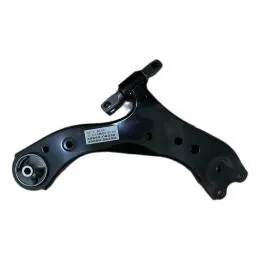3 月 . 05, 2025 03:20
Back to list
control arm price
The automotive industry is evolving at a rapid pace, driven by technological advancements and a growing consumer demand for enhanced safety and performance. One component that plays a pivotal role in ensuring the smooth functioning of vehicles is the control arm. Understanding the intricacies of control arm pricing is crucial for both consumers and industry professionals, as this part is essential for optimal vehicle performance.
Authoritativeness in understanding control arm pricing also requires acknowledging the impact of market demand and supply dynamics. An increase in vehicle production or the burgeoning popularity of certain models can lead to fluctuations in control arm prices. Moreover, the global supply chain disruptions experienced in recent years have also influenced the cost of materials and, consequently, control arm pricing. Consumers and industry buyers must stay informed about these market trends to make cost-effective purchasing decisions. Trustworthiness is another critical aspect when delving into control arm pricing. Consumers should consider products from reputable brands with a proven track record of producing durable and reliable automotive components. Authentic customer reviews and industry feedback serve as valuable resources in evaluating which brands consistently deliver high-quality control arms. Furthermore, warranty terms offered by manufacturers can be indicative of the confidence they possess in their products, often reassuring consumers of their purchase's quality. Evaluating cost savings becomes essential when purchasing control arms. While opting for lower-cost, non-OEM (Original Equipment Manufacturer) parts might seem economical initially, they could lead to higher long-term expenses due to increased wear and tear and potential safety risks. Conversely, investing in high-quality OEM control arms might involve a higher upfront cost, but the longevity and reliability offered ensure optimal vehicle performance and reduce maintenance costs over time. In conclusion, understanding the various elements influencing control arm price is crucial for making informed purchasing decisions. By considering factors such as material composition, manufacturing processes, market dynamics, and brand reputation, consumers can select control arms that best suit their budget and performance needs. Emphasizing expertise, authoritativeness, and trustworthiness in these evaluations not only ensures optimal vehicle performance but also enhances safety and overall satisfaction.


Authoritativeness in understanding control arm pricing also requires acknowledging the impact of market demand and supply dynamics. An increase in vehicle production or the burgeoning popularity of certain models can lead to fluctuations in control arm prices. Moreover, the global supply chain disruptions experienced in recent years have also influenced the cost of materials and, consequently, control arm pricing. Consumers and industry buyers must stay informed about these market trends to make cost-effective purchasing decisions. Trustworthiness is another critical aspect when delving into control arm pricing. Consumers should consider products from reputable brands with a proven track record of producing durable and reliable automotive components. Authentic customer reviews and industry feedback serve as valuable resources in evaluating which brands consistently deliver high-quality control arms. Furthermore, warranty terms offered by manufacturers can be indicative of the confidence they possess in their products, often reassuring consumers of their purchase's quality. Evaluating cost savings becomes essential when purchasing control arms. While opting for lower-cost, non-OEM (Original Equipment Manufacturer) parts might seem economical initially, they could lead to higher long-term expenses due to increased wear and tear and potential safety risks. Conversely, investing in high-quality OEM control arms might involve a higher upfront cost, but the longevity and reliability offered ensure optimal vehicle performance and reduce maintenance costs over time. In conclusion, understanding the various elements influencing control arm price is crucial for making informed purchasing decisions. By considering factors such as material composition, manufacturing processes, market dynamics, and brand reputation, consumers can select control arms that best suit their budget and performance needs. Emphasizing expertise, authoritativeness, and trustworthiness in these evaluations not only ensures optimal vehicle performance but also enhances safety and overall satisfaction.
Next:
Latest news
Upgrade Your Vehicle with Quality Control Arms
NewsNov.01,2024
Unlock Superior Performance with Our Control Arms for Sale
NewsNov.01,2024
Unlock Optimal Vehicle Performance with Diverse Control Arm Types
NewsNov.01,2024
Transform Your Ride with Lower Control Arm Replacement
NewsNov.01,2024
Revolutionize Your Ride with Control Arm Mounts
NewsNov.01,2024
Elevate Your Vehicle with Premium Control Arms
NewsNov.01,2024









